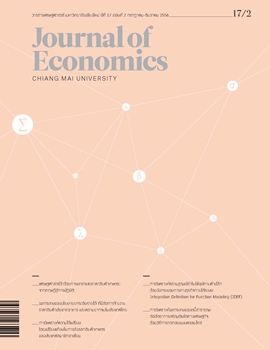ผลกระทบของนโยบายยกระดับรายได้ ที่มีต่อการจ้างงาน ราคาสินค้าประเภทอาหาร และความยากจนในประเทศไทย
Keywords:
raising income policy, employment, food prices, poverty, computable general equilibrium modelAbstract
งานวิจัยนี้มีวัตถุประสงค์ เพื่อประเมินผลกระทบของนโยบายยกระดับรายได้ที่มีต่อการ จ้างงาน ราคาสินค้าประเภทอาหาร และความยากจนในประเทศไทย โดยนำข้อมูลบัญชี ประชาชาติของประเทศไทย ปี 2009 มาจัดทำเป็นบัญชีเมตริกซ์สังคมมหภาค ซึ่งเป็นฐานข้อมูล ในการวิเคราะห์ถึงผลกระทบที่มีต่อระบบเศรษฐกิจโดยรวมของประเทศโดยแบบจำลองการ คำนวณดุลยภาพทั่วไป การศึกษาแบ่งออกเป็น 2 ส่วน ส่วนที่หนึ่งเป็นการประเมินผลกระทบ ของการเพิ่มค่าจ้างแรงงานสำหรับลูกจ้างรายวันเท่านั้น ส่วนที่สองเป็นการประเมินผลกระทบ ของการเพิ่มค่าจ้างแรงงานสำหรับลูกจ้างรายวันและเงินเดือนสำหรับลูกจ้างประจำและ เงินเดือนสำหรับลูกจ้างประจำเพิ่มขึ้นเพียงร้อยละ 10
ผลการศึกษาทั้งสองส่วนให้ผลการศึกษาที่ไม่แตกต่างกัน กล่าวคือการเพิ่มขึ้น ของค่าจ้างแรงงาน ส่งผลให้การจ้างงานยังคงไม่เปลี่ยนแปลงมากนัก ขณะที่ส่งผลให้ราคา สินค้าประเภทอาหารเพิ่มขึ้น และรายได้ของครัวเรือนเพิ่มขึ้น โดยรายได้ของคนจนจะเพิ่มขึ้น มากกว่าคนรวย แต่ช่องว่างระหว่างคนจนและคนรวยจะยังคงมีอยู่ แต่การเพิ่มขึ้นของ ค่าจ้างแรงงานสำหรับลูกจ้างรายวันและเงินเดือนสำหรับลูกจ้างประจำจะส่งผลกระทบในขนาด ที่มากกว่า
ดังนั้นรัฐบาลควรให้การสนับสนุนการเพิ่มผลิตภาพการผลิตให้ได้ผลผลิตที่สูงขึ้น ให้มีการจ้างงานเพิ่มขึ้นในภาคการผลิตต่างๆ เพื่อเพิ่มรายได้ของภาคครัวเรือน อุปสงค์ มวลรวมจะเพิ่มขึ้น ส่งเสริมให้ภาคการผลิตมีภูมิคุ้มกันที่ดี คือสามารถที่จะอยู่ได้ด้วย ตัวเอง ลดการพึ่งพิงสถาบันอื่นๆ จากภายนอก เศรษฐกิจของประเทศก็จะมีการพัฒนาได้ อย่างยั่งยืน ลดช่องว่างระหว่างคนจนและคนรวยลง และการกระจายรายได้อย่างเป็นธรรมมากขึ้น
THE IMPACTS OF THE RAISING INCOME POLICY ON EMPLOYMENT, FOOD PRICES, AND POVERTY IN THAILAND
The purpose of this research is to analyze the impacts of the raising income policy on employment, food prices and poverty in Thailand. It utilizes Thailand 2009 national income account data to construct the macro social accounting matrix. This matrix is then used as a database for analyzing the impacts on the whole economy by the computable general equilibrium model. The research is divided into two parts: the first part evaluates the impacts when only daily workers’ income is increased, while the second part evaluates the impact when both daily workers’ income and permanent workers’ salary is increased by 10%. The results from both parts indicate that the raising of income causes a slight change in employment and an increase in food price as well as household income. The magnitude of the increase in the second part is more than the increase in the first part. Additionally, the income of the poor is increase more than that of the rich. However, the gap between the rich and the poor still exists.
Therefore, the government should promote productivity growth and create more jobs in several production sectors to increase household income. This will raise the aggregate demand and help production sectors survive this shift by reducing the need to get support from other sources. Additionally, economic will have sustainable growth. The gap between the poor and the rich will be shrinking, and income distribution will be fairer.
Downloads
Issue
Section
License
All opinions and contents in the CMJE are the responsibility of the author(s). Chiang Mai University Journal of Economics reserves the copyright for all published materials. Papers may not be reproduced in any form without the written permission from Chiang Mai University Journal of Economics.






